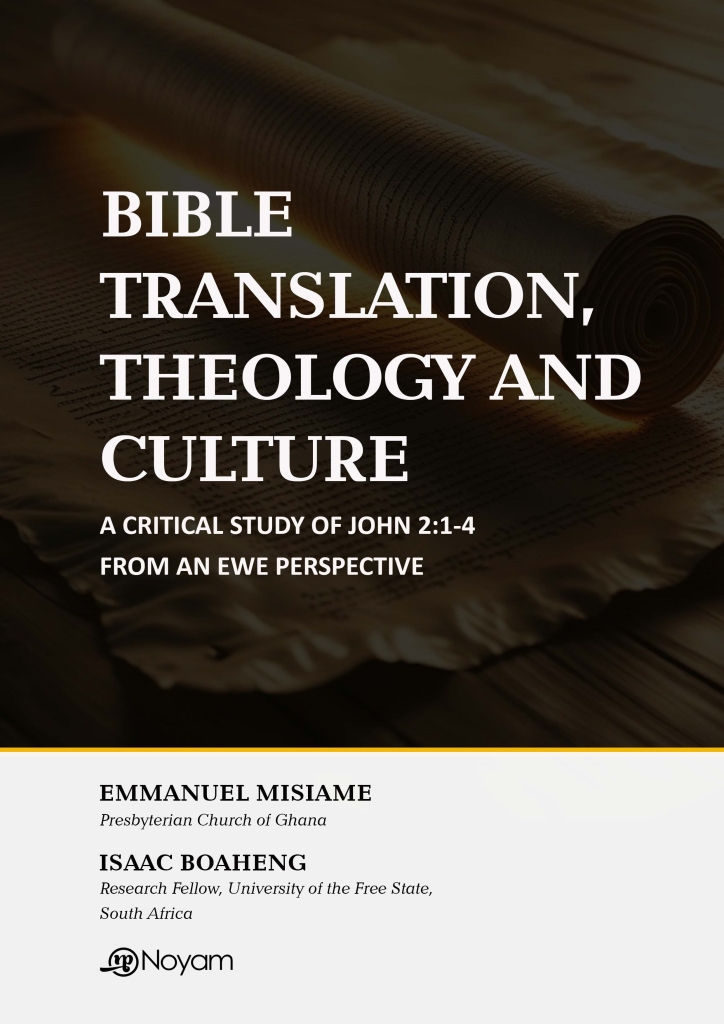
Bible Translation, Theology and Culture
Author: Emmanuel Misiame & Isaac Boaheng
ISBN 978–9988–9531–6–4
DOI: 10.38159/npub.eb2025101
Published: 7th November, 2025.
The intersection of Bible translation, theology, and culture is a rich and complex field of study. As the Word of God is translated into diverse languages and contexts, questions arise about how to faithfully convey the original meaning while also allowing the text to speak powerfully within a particular cultural framework. This book, Bible Translation, Theology and Culture: A Critical Study of John 2:1-4 from an Ewe Perspective, tackles these important issues through a focused examination of John 2:1-4, the account of Jesus turning water into wine at the wedding in Cana. The authors explore the historical, linguistic, and cultural background of the text, both in its original Jewish context and in the Ewe worldview, to offer fresh insights that will benefit biblical scholars, translators, and all who seek to apply Scripture faithfully in their cultural settings.
The book is organised into five chapters that guide the reader through the key issues. Chapter 1 lays the groundwork by introducing the book while Chapter 2 provides a theoretical review of Bible translation and interpretation, with a focus on the Ewe context. Chapter 3 presents an exegetical interpretation of John 2:1-4, exploring the text’s background, structure, and implications. Chapter 4 is particularly illuminating, as it considers the role of women in Ewe culture and compares it to the Jewish context, drawing out the analytical implications for Ewe mother-tongue Bible readers. Finally, Chapter 5 summarises the key findings and offers a general conclusion to the book.
As the global church continues to grow and mature, we must engage in thoughtful, culturally sensitive biblical interpretation and translation. This book makes a valuable contribution to that ongoing conversation, demonstrating how a careful, contextual reading of Scripture can yield fresh insights and applications for the church today.
DEDICATION.. iv
ACKNOWLEDGEMENTS. v
PREFACE.. vii
TABLE OF CONTENT. viii
LIST OF ABBREVIATIONS. xii
CHAPTER ONE.. 1
GENERAL INTRODUCTION.. 1
Why this book. 1
Research Approach Used. 8
Data. 9
Organisation of the book. 9
CHAPTER TWO.. 11
BIBLE TRANSLATION AND INTERPRETATION.. 11
Bible Translation. 11
Historical Overview of Bible Translation in Africa. 15
Biblical and Early Church Era. 15
The Missionary Era. 17
Modern Era. 18
Philosophies of Translation. 20
Brief History of Structuralism.. 21
Ideologies of Structuralism.. 22
Challenges. 24
Deconstruction Philosophy in Bible Translation. 28
Linguistics Approach to Deconstruction Theory (Dynamic/Functional Equivalence) 30
Functional Approach ( Skopos Theory). 33
Exegetical/Hermeneutical Considerations in Bible Translation. 35
Comparative Value of Language. 37
Linguistic Considerations. 39
Contextual Considerations. 40
Cultural Basis for Bible Interpretation. 41
Mother-tongue Translations. 43
The Spade Work of the Ewe Bible Translation. 45
Towards A New Ewe Bible Beyond 1970. 50
Conclusion. 54
CHAPTER THREE.. 55
AN EXEGESIS OF JOHN 2:1-4. 55
Authorship. 55
Purpose of the Book. 57
Date. 58
Place of Origin and Audience. 59
The Genre of John. 60
Structure and Outline of John. 61
The Setting of The Wedding at Cana. 62
Study Outline. 64
The Text (Jhn 2:1-4). 64
Textual Criticism.. 65
Text delimitation and contextual analysis. 68
The Chiastic Structure For John 2:1-4 Can Be Represented As Follows: 68
Morphological and Syntactical Analysis of John 2:1-4. 70
C- And Jesus and his disciples were also invited to the wedding. 72
The Role of Women in Ancient Jewish Society. 81
Linguistic Analysis of “the Vocative Γύναι “Woman” and Τί ἐμοὶ καὶ σοί, My time is not up” in John 2:1-4. 82
The Debate. 83
The Pragmatic force of γύvαι. 85
Conclusion. 88
CHAPTER FOUR.. 90
WOMEN, CULTURE AND CHRISTIANITY AMONG THE EWE OF GHANA.. 90
The Ewe People’s History, Religion, and Culture. 90
The Anlo-Ewe’s of Ghana. 92
Political traditions of the Indigenous Ewe. 95
Christianity Among the Ewe. 97
Some Religious Beliefs of the Ewe. 98
The Supreme God (Mawuga). 99
Ewe Anthropology and Gender Constructions -Woman versus Mother. 100
Motherhood in the Ewe Culture. 101
Political Leadership. 102
Women in Ewe Culture versus Jewish Women. 103
Household Management 104
Mothers play the role of agents of cultural preservation. 104
Women Priestess and Community Leadership. 105
Aspects of Family Law of Inheritance Among the Ewe. 106
Field Report and Analysis of John 2: 1-4: Implications For Ewe Mother-Tongue Bible Readers 108
Conclusion. 126
CHAPTER FIVE.. 127
CONCLUSION.. 127
Summary. 128
Summary of Findings. 129
Proposed Translation of John 2:1-4. 130
Issues Emerging Out of The Study. 131
Recommendations. 132
Conclusion. 133
BIBLIOGRAPHY.. 135
ABOUT AUTHORS 149
Emmanuel Misiame holds a Master of Philosophy degree in Religious Studies from the Kwame Nkrumah University of Science and Technology, Kumasi, Ghana. He is an ordained minister of the Presbyterian Church of Ghana. Misiame is married to Agnes, and they are blessed with four children.
Isaac Boaheng holds a PhD in Theology from the University of the Free State, South Africa. He is a Senior Lecturer in Theology and Christian Ethics at the Christian Service University, Ghana, and a Research Fellow at the Department of Biblical and Religion Studies, University of the Free State, South Africa. Boaheng is married to Gloria, and they are blessed with five children.
Misiame, Emmanuel, and Isaac Boaheng. Bible Translation, Theology and Culture.(Accra: Noyam, 2025).
